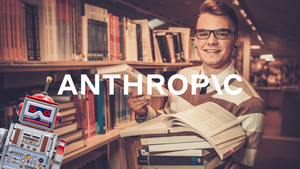Anthropic has agreed a preliminary settlement with the group of authors who sued the AI company for copyright infringement. Although the terms of the settlement are not yet known, the deal could prove to be influential in the context of the many other legal battles involving copyright owners and AI companies, not least that between Anthropic and a number of music publishers.
In the US, legal battles between copyright owners and AI companies have mainly centred on the big debate over whether or not AI training constitutes fair use under US copyright law.
That debate could take years to resolve through the courts - likely going to appeal, and then to the Supreme Court before being definitively decided - but Anthropic’s settlement in this dispute may demonstrate how copyright owners can pressure payments out of AI companies much quicker.
For the AI firms themselves, reaching a settlement on contentious issues like these may be sensible, allowing them to move on in the AI race without legal distractions. And, of course, with Anthropic rumoured to be on the cusp of raising another $10 billion in funding, with a $170 billion valuation, it is presumably not short of a dollar or two.
Last month the authors’ lawsuit against Anthropic was granted class action status, meaning a positive outcome would benefit every writer involved in the millions of books for which the AI company was allegedly liable for copyright infringement.
The deal will benefit the whole class, with attorney Justin Nelson telling reporters, “this historic settlement will benefit all class members”, before adding, “we look forward to announcing details of the settlement in the coming weeks”.
The out of court settlement comes despite a ruling in June which, at first glance, seemed to favour Anthropic. The AI company argued that training an AI model does constitute fair use meaning it didn’t need permission to copy millions of books when training its AI chatbot Claude.
And Judge William Alsup agreed, stating that when copyright protected works are used to train AI models the ‘use’ is highly transformative, and therefore covered by the fair use principle.
However, he said the fair use defence only applied if Anthropic had legitimately sourced its training materials. The AI company had bought and copied some physical books, but originally it downloaded millions of ebooks from piracy sites. And it seemed likely that those downloads infringed copyright.
Given US copyright law provides statutory damages of up to $150,000 for each and every act of infringement, that could have resulted in trillion dollar damages.
Speaking to Wired, law professor Edward Lee says that Anthropic moving towards a settlement despite initially “fighting tooth and nail” in the courts in relation to this legal battle is “a stunning turn of events”. However, because of Alsup’s ruling on the pirated content, “Anthropic was staring at the risk of statutory damages in ‘doomsday’ amounts”.
Most creators and copyright owners argue that AI training is never fair use, and would obviously prefer judges to reach that conclusion in court.
However, given how many AI companies are thought to have accessed content from illegitimate sources when creating their training datasets, Alsup’s ruling - if adopted more widely in other US courts - arguably puts rightsholders in a strong position.
The music publishers suing Anthropic recently asked to amend their lawsuit so that they can stress that the AI company sourced copies of the lyrics the music companies control from piracy sources. The hope, of course, is that that will make it difficult for Anthropic to employ the fair use defence.
It remains to be seen how the large community of writers that make up the class in the authors v Anthropic case react to the proposed settlement and whether the framework of this deal could be employed in other legal disputes.
Other AI companies that have used content without permission will also be reviewing the settlement closely, as they consider the pros and cons of going the settlement route, versus continuing with lobbying and litigation that could ultimately get them free access to all that content. Or, alternatively, saddle them with those ‘doomsday’ damages.

